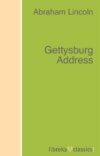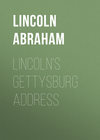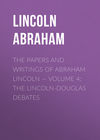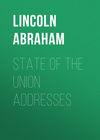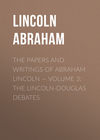Loe raamatut: «The Papers And Writings Of Abraham Lincoln — Volume 5: 1858-1862», lehekülg 23
TO MRS. FREMONT
WASHINGTON, D.C., September 12, 1861
Mrs. GENERAL FREMONT.
MY DEAR MADAM: — Your two notes of to-day are before me. I answered the letter you bore me from General Fremont on yesterday, and not hearing from you during the day, I sent the answer to him by mail. It is not exactly correct, as you say you were told by the elder Mr. Blair, to say that I sent Postmaster-General Blair to St. Louis to examine into that department and report. Postmaster-General Blair did go, with my approbation, to see and converse with General Fremont as a friend. I do not feel authorized to furnish you with copies of letters in my possession without the consent of the writers. No impression has been made on my mind against the honor or integrity of General Fremont, and I now enter my protest against being understood as acting in any hostility toward him.
Your obedient servant,
A. LINCOLN.
TO JOSEPH HOLT,
EXECUTIVE MANSION, SEPTEMBER 12, 1861
HON. JOSEPH HOLT.
DEAR SIR: — Yours of this day in relation to the late proclamation of General Fremont is received yesterday I addressed a letter to him, by mail, on the same subject, and which is to be made public when he receives it. I herewith send you a copy of that letter, which perhaps shows my position as distinctly as any new one I could write. I will thank you not to make it public until General Fremont shall have had time to receive the original.
Your obedient servant,
A. LINCOLN.
TO GENERAL SCOTT
WASHINGTON, D.C., September 16, 1861
DEAR SIR: — Since conversing with you I have concluded to request you to frame an order for recruiting North Carolinians at Fort Hatteras. I suggest it to be so framed as for us to accept a smaller force — even a company — if we cannot get a regiment or more. What is necessary to now say about officers you will judge. Governor Seward says he has a nephew (Clarence A. Seward, I believe) who would be willing to go and play colonel and assist in raising the force. Still it is to be considered whether the North Carolinians will not prefer officers of their own. I should expect they would.
Yours very truly,
A. LINCOLN.
TO SECRETARY CAMERON
EXECUTIVE MANSION, September 18, 1861
HON. SECRETARY OF WAR. MY DEAR SIR: — To guard against misunderstanding, I think fit to say that the joint expedition of the army and navy agreed upon some time since, and in which General T. W. Sherman was and is to bear a conspicuous part, is in no wise to be abandoned, but must be ready to move by the 1st of, or very early in, October. Let all preparations go forward accordingly.
Yours truly,
A. LINCOLN.
TO GENERAL FREMONT,
WASHINGTON, SEPTEMBER 12, 1861
MAJOR-GENERAL FREMONT:
Governor Morton telegraphs as follows: "Colonel Lane, just arrived by special train, represents Owensborough, forty miles above Evansville, in possession of secessionists. Green River is navigable. Owensborough must be seized. We want a gunboat sent up from Paducah for that purpose." Send up the gunboat if, in your discretion, you think it right. Perhaps you had better order those in charge of the Ohio River to guard it vigilantly at all points.
A. LINCOLN.
To O. H. BROWNING
(Private and Confidential)
EXECUTIVE MANSION, WASHINGTON SEPTEMBER 22, 1861 HON. O. H. BROWNING.
MY DEAR SIR: — Yours of the 17th is just received; and coming from you, I confess it astonishes me. That you should object to my adhering to a law which you had assisted in making and presenting to me less than a month before is odd enough. But this is a very small part. General Fremont's proclamation as to confiscation of property and the liberation of slaves is purely political and not within the range of military law or necessity. If a commanding general finds a necessity to seize the farm of a private owner for a pasture, an encampment, or a fortification, he has the right to do so, and to so hold it as long as the necessity lasts; and this is within military law, because within military necessity. But to say the farm shall no longer belong to the owner, or his heirs forever, and this as well when the farm is not needed for military purposes as when it is, is purely political, without the savor of military law about it. And the same is true of slaves. If the general needs them, he can seize them and use them; but when the need is past, it is not for him to fix their permanent future condition. That must be settled according to laws made by law-makers, and not by military proclamations. The proclamation in the point in question is simply "dictatorship." It assumes that the general may do anything he pleases confiscate the lands and free the slaves of loyal people, as well as of disloyal ones. And going the whole figure, I have no doubt, would be more popular with some thoughtless people than that which has been done, But I cannot assume this reckless position, nor allow others to assume it on my responsibility.
You speak of it as being the only means of saving the government. On the contrary, it is itself the surrender of the government. Can it be pretended that it is any longer the Government of the United States — any government of constitution and laws wherein a general or a president may make permanent rules of property by proclamation? I do not say Congress might not with propriety pass a law on the point, just such as General Fremont proclaimed.
I do not say I might not, as a member of Congress, vote for it. What I object to is, that I, as President, shall expressly or impliedly seize and exercise the permanent legislative functions of the government.
So much as to principle. Now as to policy. No doubt the thing was popular in some quarters, and would have been more so if it had been a general declaration of emancipation. The Kentucky Legislature would not budge till that proclamation was modified; and General Anderson telegraphed me that on the news of General Fremont having actually issued deeds of manumission, a whole company of our volunteers threw down their arms and disbanded. I was so assured as to think it probable that the very arms we had furnished Kentucky would be turned against us. I think to lose Kentucky is nearly the same as to lose the whole game. Kentucky gone, we cannot hold Missouri, nor, as I think, Maryland. These all against us, and the job on our hands is too large for us. We would as well consent to separation at once, including the surrender of this Capital. On the contrary, if you will give up your restlessness for new positions, and back me manfully on the grounds upon which you and other kind friends gave me the election and have approved in my public documents, we shall go through triumphantly. You must not understand I took my course on the proclamation because of Kentucky. I took the same ground in a private letter to General Fremont before I heard from Kentucky.
You think I am inconsistent because I did not also forbid General Fremont to shoot men under the proclamation. I understand that part to be within military law, but I also think, and so privately wrote General Fremont, that it is impolitic in this, that our adversaries have the power, and will certainly exercise it, to shoot as many of our men as we shoot of theirs. I did not say this in the public letter, because it is a subject I prefer not to discuss in the hearing of our enemies.
There has been no thought of removing General Fremont on any ground connected with his proclamation, and if there has been any wish for his removal on any ground, our mutual friend Sam. Glover can probably tell you what it was. I hope no real necessity for it exists on any ground.
Your friend, as ever,
A. LINCOLN.
MEMORANDUM FOR A PLAN OF CAMPAIGN
[OCTOBER 1?] 1861
On or about the 5th of October (the exact date to be determined hereafter) I wish a movement made to seize and hold a point on the railroad connecting Virginia and Tennessee near the mountain-pass called Cumberland Gap. That point is now guarded against us by Zollicoffer, with 6000 or 8000 rebels at Barboursville Ky., — say twenty-five miles from the Gap, toward Lexington. We have a force of 5000 or 6000 under General Thomas, at Camp Dick Robinson, about twenty-five miles from Lexington and seventy-five from Zollicoffer's camp, On the road between the two. There is not a railroad anywhere between Lexington and the point to be seized, and along the whole length of which the Union sentiment among the people largely predominates. We have military possession of the railroad from Cincinnati to Lexington, and from Louisville to Lexington, and some home guards, under General Crittenden, are on the latter line. We have possession of the railroad from Louisville to Nashville, Tenn., so far as Muldraugh's Hill, about forty miles, and the rebels have possession of that road all south of there. At the Hill we have a force of 8000, under General Sherman, and about an equal force of rebels is a very short distance south, under General Buckner.
We have a large force at Paducah, and a smaller at Port Holt, both on the Kentucky side, with some at Bird's Point, Cairo, Mound City, Evansville, and New Albany, all on the other side, and all which, with the gunboats on the river, are perhaps sufficient to guard the Ohio from Louisville to its mouth.
About supplies of troops, my general idea is that all from Wisconsin, Minnesota, Iowa, Illinois, Missouri, and Kansas, not now elsewhere, be left to Fremont. All from Indiana and Michigan, not now elsewhere, be sent to Anderson at Louisville. All from Ohio needed in western Virginia be sent there, and any remainder be sent to Mitchell at Cincinnati, for Anderson. All east of the mountains be appropriated to McClellan and to the coast.
As to movements, my idea is that the one for the coast and that on Cumberland Gap be simultaneous, and that in the meantime preparation, vigilant watching, and the defensive only be acted upon; this, however, not to apply to Fremont's operations in northern and middle Missouri. That before these movements Thomas and Sherman shall respectively watch but not attack Zollicoffer and Buckner. That when the coast and Gap movements shall be ready Sherman is merely to stand fast, while all at Cincinnati and all at Louisville, with all on the line, concentrate rapidly at Lexington, and thence to Thomas's camp, joining him, and the whole thence upon the Gap. It is for the military men to decide whether they can find a pass through the mountains at or near the Gap which cannot be defended by the enemy with a greatly inferior force, and what is to be done in regard to this.
The coast and Gap movements made, Generals McClellan and Fremont, in their respective departments, will avail themselves of any advantages the diversions may present.
[He was entirely unable to get this started, Sherman would have taken an active part if given him, the others were too busy getting lines of communication guarded — and discovering many "critical" supply items that had not been sent them. Also the commanding general did not like it. D.W.]
TO THE SECRETARY OF STATE
EXECUTIVE MANSION, October 4, 1861
HONORABLE SECRETARY OF STATE.
DEAR SIR: — Please see Mr. Walker, well vouched as a Union man and son-in-law of Governor Morehead, and pleading for his release. I understand the Kentucky arrests were not made by special direction from here, and I am willing if you are that any of the parties may be released when James Guthrie and James Speed think they should be.
Yours truly,
A. LINCOLN.
TO THE VICEROY OF EGYPT
WASHINGTON, October 11, 1861
GREAT AND GOOD FRIEND: — I have received from Mr. Thayer, Consul-General of the United States at Alexandria, a full account of the liberal, enlightened, and energetic proceedings which, on his complaint, you have adopted in bringing to speedy and condign punishment the parties, subjects of your Highness in Upper Egypt, who were concerned in an act of criminal persecution against Faris, an agent of certain Christian missionaries in Upper Egypt. I pray your Highness to be assured that these proceedings, at once so prompt and so just, will be regarded as a new and unmistakable proof equally of your Highness's friendship for the United States and of the firmness, integrity and wisdom, with which the government of your Highness is conducted. Wishing you great prosperity and success, I am your friend,
A. LINCOLN.
HIS HIGHNESS MOHAMMED SAID PACHA, Viceroy of Egypt and its Dependencies, etc.
By the President: WILLIAM H. SEWARD, Secretary of State.
ORDER AUTHORIZING SUSPENSION OF THE WRIT OF HABEAS CORPUS
October 14 1861
LIEUTENANT-GENERAL WINFIELD SCOTT:
The military line of the United States for the suppression of the insurrection may be extended so far as Bangor, in Maine. You and any officer acting under your authority are hereby authorized to suspend the writ of habeas corpus in any place between that place and the city of Washington.
A. LINCOLN.
By the President: WILLIAM H. SEWARD, Secretary of State.
TO SECRETARY OF INTERIOR
EXECUTIVE MANSION, October 14, 1861
HON. SEC. OF INTERIOR.
DEAR SIR: — How is this? I supposed I was appointing for register of wills a citizen of this District. Now the commission comes to me "Moses Kelly, of New Hampshire." I do not like this.
Yours truly,
A. LINCOLN.
TWO SONS WHO WANT TO WORK
TO MAJOR RAMSEY
EXECUTIVE MANSION, October 17, 1861
MAJOR RAMSEY.
MY DEAR SIR: — The lady bearer of this says she has two sons who want to work. Set them at it if possible. Wanting to work is so rare a want that it should be encouraged.
Yours truly,
A. LINCOLN.
TO GENERAL THOMAS W. SHERMAN
WASHINGTON, October 18, 1861
GENERAL THOMAS SHERMAN, Annapolis, Md.:
Your despatch of yesterday received and shown to General McClellan. I have promised him not to direct his army here without his consent. I do not think I shall come to Annapolis.
A. LINCOLN.
TO GENERAL CURTIS, WITH INCLOSURES
WASHINGTON, October 24, 1861
BRIGADIER-GENERAL S. R. CURTIS.
MY DEAR SIR: — Herewith is a document — half letter, half order — which, wishing you to see, but not to make public, I send unsealed. Please read it and then inclose it to the officer who may be in command of the Department of the West at the time it reaches him. I cannot now know whether Fremont or Hunter will then be in command.
Yours truly,
A. LINCOLN.
WASHINGTON, October 24, 1861
BRIGADIER-GENERAL S. R. CURTIS
DEAR SIR: — On receipt of this, with the accompanying inclosures, you will take safe, certain, and suitable measures to have the inclosure addressed to Major-General Fremont delivered to him with all reasonable despatch, subject to these conditions only: that if, when General Fremont shall be reached by the messenger — yourself or any one sent by you — he shall then have, in personal command, fought and won a battle, or shall then be actually in a battle, or shall then be in the immediate presence of the enemy in expectation of a battle, it is not to be delivered, but held for further orders. After, and not till after, the delivery to General Fremont, let the inclosure addressed to General Hunter be delivered to him.
Your obedient servant,
A. LINCOLN.
(General Orders No. 18.) HEADQUARTERS OF THE ARMY,
WASHINGTON, October 24, 1861
Major-General Fremont, of the United States Army, the present commander of the Western Department of the same, will, on the receipt of this order, call Major-General Hunter, of the United States Volunteers, to relieve him temporarily in that command, when he (Major-General Fremont) will report to general headquarters by letter for further orders.
WINFIELD SCOTT. By command: E. D. TOWNSEND, Assistant Adjutant-General.
WASHINGTON, October 24, 1861
TO THE COMMANDER OF THE DEPARTMENT OF THE WEST
SIR: — The command of the Department of the West having devolved upon you, I propose to offer you a few suggestions. Knowing how hazardous it is to bind down a distant commander in the field to specific lines and operations, as so much always depends on a knowledge of localities and passing events, it is intended, therefore, to leave a considerable margin for the exercise of your judgment and discretion.
The main rebel army (Price's) west of the Mississippi is believed to have passed Dade County in full retreat upon northwestern Arkansas, leaving Missouri almost freed from the enemy, excepting in the southeast of the State. Assuming this basis of fact, it seems desirable, as you are not likely to overtake Price, and are in danger of making too long a line from your own base of supplies and reinforcements, that you should give up the pursuit, halt your main army, divide it into two corps of observation, one occupying Sedalia and the other Rolla, the present termini of railroads; then recruit the condition of both corps by re-establishing and improving their discipline and instructions, perfecting their clothing and equipments, and providing less uncomfortable quarters. Of course, both railroads must be guarded and kept open, judiciously employing just so much force as is necessary for this. From these two points, Sedalia and Rolla, and especially in judicious cooperation with Lane on the Kansas border, it would be so easy to concentrate and repel any army of the enemy returning on Missouri from the southwest, that it is not probable any such attempt will be made before or during the approaching cold weather. Before spring the people of Missouri will probably be in no favorable mood to renew for next year the troubles which have so much afflicted and impoverished them during this. If you adopt this line of policy, and if, as I anticipate, you will see no enemy in great force approaching, you will have a surplus of force which you can withdraw from these points and direct to others as may be needed, the railroads furnishing ready means of reinforcing these main points if occasion requires. Doubtless local uprisings will for a time continue to occur, but these can be met by detachments and local forces of our own, and will ere long tire out of themselves.
While, as stated in the beginning of the letter, a large discretion must be and is left with yourself, I feel sure that an indefinite pursuit of Price or an attempt by this long and circuitous route to reach Memphis will be exhaustive beyond endurance, and will end in the loss of the whole force engaged in it.
Your obedient servant,
A. LINCOLN.
ORDER RETIRING GENERAL SCOTT AND APPOINTING
GENERAL McCLELLAN HIS SUCCESSOR. (General Orders, No.94.)
WAR DEPARTMENT, ADJUTANT-GENERAL'S OFFICE
WASHINGTON, November 1, 1861
The following order from the President of the United States, announcing the retirement from active command of the honored veteran Lieutenant general Winfield Scott, will be read by the army with profound regret:
EXECUTIVE MANSION, WASHINGTON
November 1, 1861
On the 1st day of November, A.D. 1861, upon his own application to the President of the United States, Brevet Lieutenant-General Winfield Scott is ordered to be placed, and hereby is placed, upon the list of retired officers of the army of the United States, without reduction in his current pay, subsistence, or allowances.
The American people will hear with sadness and deep emotion that General Scott has withdrawn from the active control of the army, while the President and a unanimous Cabinet express their own and the nation's sympathy in his personal affliction and their profound sense of the important public services rendered by him to his country during his long and brilliant career, among which will ever be gratefully distinguished his faithful devotion to the Constitution, the Union, and the flag when assailed by parricidal rebellion.
A. LINCOLN
The President is pleased to direct that Major general George B. McClellan assume the command of the army of the United States. The headquarters of the army will be established in the city of Washington. All communications intended for the commanding general will hereafter be addressed direct to the adjutant-general. The duplicate returns, orders, and other papers heretofore sent to the assistant adjutant-general, headquarters of the army, will be discontinued.
By order of the Secretary of War: L. THOMAS, Adjutant General.











